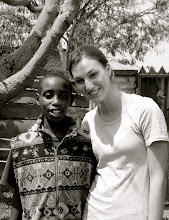Traveler’s Guide- The Rwanda Edition
- Always negotiate the price of an item before hand (food, transportation, lodging, etc.). Rwandans charge foreigners double and will purposely not understand you if you attempt to negotiate a discount after.
-Make sure to ask the hotel staff if the rooms have running water before you pay. If they do not, kindly ask if you can be directed towards a hotel that does.
- Keep orders at restaurants simple (for example, if you order a turkey burger cooked medium rare with no tomato and a side of fries instead of chips, you will end up with a taco. Short orders work best- “burger, fries”). Forget about embellishing basic menus.
- If you are walking down the street and you notice that a group of 30 children are following you, do not be alarmed. They are just curious and generally harmless.
After a week, I finally feel like I’m getting adjusted to life in Rwanda. I’m covered in mosquito bites, I’ve forgotten what a warm shower feels like, I eat avocados in some form for almost every meal, I’ve experienced food poisoning (twice), and I’ve finally met people who are on the save wavelength as me with respect to time (7:45 means 8:30 here, etc.).
It’s been a while since my last blog so I’ll do my best to update you on the last couple of days (and hopefully be able to provide some sort of narrative to explain the travelers tips I listed above as, believe it or not, they all relate to events of the past week).
We continued with our survey on Thursday and Friday at the health clinic. On Thursday the clinic offered free vaccinations for newborns. A ton of mothers were passing in and out of the clinic so we were able to interview about 40 women within 3 hours. I was amazed that a health clinic in rural Rwanda with very few resources was able to provide vaccinations at no cost to the family of the children. I also learned through the survey that individuals in the Huye district could pay 1000 Rwandan francs a year for health insurance (less than $2) and receive prenatal care and other checkups and treatments for only 220 Rwandan francs (about $.50). A majority of the women we interviewed told us that the services they received were well worth the cost of the insurance and the clinic consultation price. Many also offered good suggestions for improvements that could be made to the clinic. We will use these suggestions to set goals for our fundraising campaigns next year, and also provide RVCP with a written report, outlining the results of our survey by the end of the month.
Later in the afternoon, Caleb, Amanda, Jean Claude and I visited the National Museum of Rwanda. For the most part, we had the museum to ourselves, and unlike the Smithsonian museums in DC, we were free to touch whatever we wanted (security was pretty loose to say the least). The coolest part of the museum was a replica of a traditional Rwandan house that visitors could walk inside. The museum was built in 1989 and had not been updated since then, but it was still cool to see the history of art, architecture, and agriculture in Rwanda. Jean Claude acted as my personal guide as well, explaining every artifact as if he had used it himself.

No comments:
Post a Comment